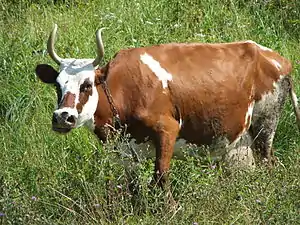< Reconstruction:Proto-Turkic

Reconstruction:Proto-Turkic/ingek
Proto-Turkic

Ingek.
Etymology
Derived from the unattested root *in and cognate to *in-gen (“female camel”). Akin to Khitan [Khitan Small needed] (uni, “ox”) and Proto-Mongolic *ünixen (“cow”), compare Mongolian үнээ (ünee).
Related terms
- *in
- *ingen
Descendants
- Medieval
- Karakhanid: اِنكاكْ (ingek), اِنْكَكْ (ingek)
- Old Turkic
- Orkhon: 𐰃𐰤𐰏𐰛 (ingek)
- Old Uyghur: ՚ynk՚k (ingek)
- Kipchak:
- Cuman: [script needed] (inek)
- Mamluk-Kipchak: [script needed] (inek)
- Khorezmian: [script needed] (inek)
- Oghuz
- Kipchak
- Karluk:
- Chagatai: اينك (inek)
- Uyghur: ئىنەك (inek)
- Chagatai: اينك (inek)
- Siberian
- Oghur:
- Chuvash: ӗне (ĕne)
- → Hungarian: ünő
References
- Starostin, Sergei; Dybo, Anna; Mudrak, Oleg (2003), “*in-gek (/*ɨn-gak), *in-ken”, in Etymological dictionary of the Altaic languages (Handbuch der Orientalistik; VIII.8), Leiden, New York, Köln: E.J. Brill
- Clauson, Gerard (1972), “ingek”, in An Etymological Dictionary of pre-thirteenth-century Turkish, Oxford: Clarendon Press, page 184
This article is issued from Wiktionary. The text is licensed under Creative Commons - Attribution - Sharealike. Additional terms may apply for the media files.
